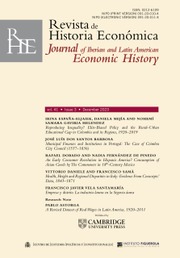Article contents
El mercado de trabajo en una empresa flexible: la Fundición Averly de Zaragoza (1880–1930)*
Published online by Cambridge University Press: 28 April 2010
Abstract
The Averly foundry in Saragossa is an enterprise belonging to the mechanical constructions branch. It opened in 1863 with eight workers, and by the end of the XlXth century it employed one hundred workers. This article tries to understand the labour policies developed by this family enterprise, as a function of its market outlook and its type of work organization, based on a division of jobs and tasks by qualifications. Looking at these policies, we consider this firm as an example of what is called «flexible specialization», with productions adapted to demands and customers' needs.
Resumen
La fundición Averly de Zaragoza, empresa perteneciente al sector de construcciones mecánicas, comenzó su andadura en 1863 con ocho trabajadores y llegó a superar a finales del siglo XIX el centenar. Este artículo trata de interpretar la política laboral desarrollada por esta empresa de carácter familiar en relación con sus perspectivas de mercado y el tipo de organización del trabajo que desarrolló, basado en una división de puestos de trabajo y tareas por cualificaciones. A la vista de dicha política conceptuamos a esta empresa como perteneciente al modelo denominado como «especialización flexible», con producciones adaptadas a pedidos y ajustadas a las necesidades de los clientes.
Keywords
- Type
- Artículos
- Information
- Revista de Historia Economica - Journal of Iberian and Latin American Economic History , Volume 22 , Issue 2 , September 2004 , pp. 425 - 469
- Copyright
- Copyright © Instituto Figuerola de Historia y Ciencias Sociales, Universidad Carlos III de Madrid 2004
References
BILIOGRAFÍA
- 1
- Cited by


